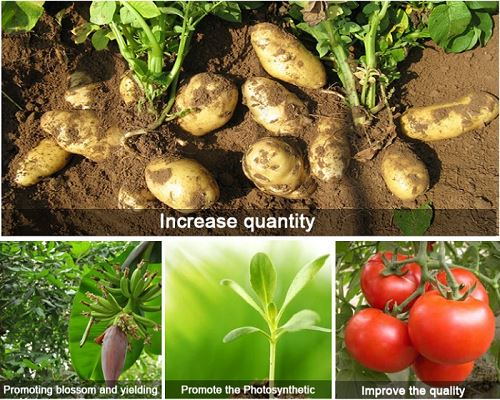Corn steep liquor as a biostimulant composition
- Categories:News
- Author:
- Origin:
- Time of issue:2021-07-16
- Views:
(Summary description)
Corn steep liquor as a biostimulant composition
(Summary description)
- Categories:News
- Author:
- Origin:
- Time of issue:2021-07-1634
- Views:

Plant growth is dictated by both internal and external factors. The internal mechanisms originate in the genetic makeup of the plant and influence the extent and timing of its growth. These internal mechanisms are regulated by signals of various types transmitted within the plant cells, between the cells, or all around the plant itself. The external factors are directly related to the immediate environment surrounding the plant. These external influences affect plant growth and include such factors as light, temperature, water, and nutrients. The external environment can place constraints on the extent to which internal mechanisms can permit the plant to grow and develop, with two of the most important factors being related to the availability of water and nutrient supplies in the soil. Cell expansion is directly related to water supply, and thus any deficit results in a smaller plant. Mineral nutrients are needed for the biochemical processes of the plant. When nutrients are in insufficient supply, growth will be less vigorous, or in extreme cases, it will cease altogether. The nutrients necessary for plant growth include: the primary macronutrients nitrogen (N), phosphorous (P), and potassium (K); the secondary macronutrients calcium (Ca), sulfur (S), and magnesium (Mg); and the micronutrients or trace minerals boron (B), chlorine (Cl), manganese (Mn), iron (Fe), zinc (Zn), copper (Cu), Molybdenum (Mo), and Selenium (Se). Optimal temperatures are also necessary for plant growth. The required temperature range will depend on the species, but most plants grow slowly at low temperatures, i.e., 0° C. to 10° C., and some tropical plants are damaged or even killed at low, but above-freezing temperatures. Light is also important in the control of plant growth, in that it drives the process of photosynthesis.
Corn steep liquor (CSL) is a liquid by-product of the corn wet-milling process used to obtain corn starch and high fructose corn syrup (HFCS). CSL consists of concentrated corn solubles extracted during a process whereby corn, after having been shelled and air-cleaned, is soaked in water (steeped), and then fractionated into its principal components by a combination of flotation and wet-screening procedures. During steeping, the soluble materials are dissolved, the corn is softened, and its structure weakened and broken, which facilitates the grinding and further separations of its components. The resulting concentrate is crude corn steep liquor, which may be further combined with gluten and fibrous materials to be sold as animal feed, or it can be used for other purposes, with or without further processing. Besides being used as a nutrient for ruminant animals, CSL has also been used in the penicillin industry as a culture medium for penicillin production.
CSL is commercially available as approximately 50% water with the rest made up of corn components; water soluble proteins, free amino acids, minerals, vitamins, reducing sugars (e.g., dextrose), and other natural organic acids (e.g., lactic acid). CSL is a viscous slurry with a color ranging from light to dark brown. CSL has a pH of about 4.0 and consists predominantly of naturally occurring nutritive materials such as water soluble proteins, amino acids (e.g., alanine, arginine, aspartic acid, cysteine, glutamic acid, histidine, isoleucine, leucine, lysine, methionine, phenylalanine, proline, threonine, tyrosine, valine), vitamins (e.g., B-complex), carbohydrates, organic acids (e.g., lactic acid), minerals (e.g., Mg, P, K, Ca, S), enzymes and other nutrients.
The Daniels Biostimulant Additive comprising CSL was proven superior over the first control (which received no biostimulant or inoculant), yielding over 10% more usable fruit with greater weight and better quality. Additionally, combining the Daniels Biostimulant Additive with either form of microbial inoculant (“cocktail” or “singular”) outperformed both of the treatments using only the microbial inoculant, yielding a higher mean number of usable fruit of greater quality. Furthermore, combining the Daniels Biostimulant Additive with the “singular” microbial inoculant was found to outperform the combination with the “cocktail” microbial inoculant in terms of the percentages and weight of usable fruit harvested in the study.
MOBILE SITE

CONTACT US
Add: Songfang Village,Zouping County,Shandong Province,China.
Tel: +86-531-88985995
Mobile: +8613153104619
E.Sales dept: sales@jucitrade.com
Copyright © 2020 Juci Biological 鲁ICP备2020037300号-1 Power by: 300.cn





